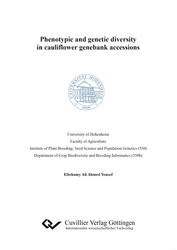| Areas | |
|---|---|
| Serie de libros (96) |
1381
|
| Nachhaltigkeit |
3
|
| Gesundheitswesen |
1
|
| Letra |
2370
|
| Ciencias Naturales |
5408
|
| Matemática | 229 |
| Informática | 319 |
| Física | 980 |
| Química | 1364 |
| Geociencias | 131 |
| Medicina humana | 243 |
| Estomatología | 10 |
| Veterinaria | 108 |
| Farmacia | 147 |
| Biología | 835 |
| Bioquímica, biología molecular, tecnología genética | 121 |
| Biofísica | 25 |
| Nutrición | 45 |
| Agricultura | 1005 |
| Silvicultura | 201 |
| Horticultura | 20 |
| Ecología y conservación de la tierra | 148 |
| Ciencias Ingeniería |
1795
|
| General |
98
|
|
Leitlinien Unfallchirurgie
5. Auflage bestellen |
|
Erweiterte Suche
Phenotypic and genetic diversity in cauliflower genebank accessions (Tienda española)
Eltohamy Ali Ahmed Yousef (Autor)Previo
Indice, PDF (160 KB)
Lectura de prueba, PDF (340 KB)
Low genetic diversity in cauliflower is one of the big challenges that hinders plant breeders in developing cultivars that meet the different needs of farmers (high yield, high adaptation and resistance to biotic and abiotic stresses) and consumers (high quality). The most efficient way to improve the performance of cauliflower varieties is to access large, diverse pools of genetic material of this crop. Therefore, the overall aims of this thesis have been to assess the phenotypic and genotypic diversity of a broad collection of genebank cauliflower accessions, as well as to perform association mapping and genomic prediction on this crop.
This study evaluated the performance of 200 genebank accessions of cauliflower at two farming system (organic and conventional) and over three growing seasons and genotyped them by genotyping by sequencing approach (GBS) to infer the population structure and genetic diversity. Also, this study investigated the potential of different modern molecular breeding methods in cauliflower , association mapping and genomic selection.
The findings laid out in this thesis show that GBS could be used effectively for several tasks in the commercial improvement of cauliflower in particular and in B. oleraceae in general, without the need for imputation of missing values. These tasks include genetic diversity analysis, marker trait association and genomic prediction. Also, the current thesis affirms that both association mapping and genomic prediction have the potential to accelerate the genetic gain in cauliflower breeding programs. In addition, several promising genetic materials (for high yield and stability) were found, which could be used as starting materials in cauliflower breeding programs, and especially for organic farming.
| ISBN-13 (Impresion) | 9783736990166 |
| ISBN-13 (E-Book) | 9783736980167 |
| Formato | A5 |
| Idioma | Inglés |
| Numero de paginas | 184 |
| Laminacion de la cubierta | mate |
| Edicion | 1. Aufl. |
| Lugar de publicacion | Göttingen |
| Lugar de la disertacion | Hohenheim |
| Fecha de publicacion | 09.06.2015 |
| Clasificacion simple | Tesis doctoral |
| Area |
Agricultura
Plantación |
| Palabras claves | Cauliflower, genetic diversity, organic breeding, genebank accessions, genotyping by sequencing, association mapping, genomic prediction |








